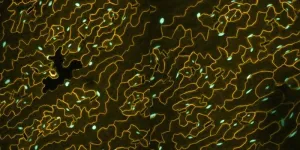(Press-News.org) June 3, 2024 (Rockville, MD)
The National Foundation for Cancer Research (NFCR) is announcing that the blue-ribbon selection committee, composed of world-renowned research leaders and visionaries, has awarded the 2024 Szent-Györgyi Prize for Progress in Cancer Research to Dennis J. Slamon, M.D., Ph. D. from UCLA Health for his groundbreaking research discoveries that helped to shape the field of precision medicine for breast cancer patients.
The cancer research community will celebrate Dr. Slamon and his accomplishments on October 18, 2024, at The Szent-Györgyi Prize Dinner and Award Ceremony, NFCR's signature event of its daylong Global Summit and Award Ceremonies for Cancer Research & Entrepreneurship in Washington, DC, at The National Press Club. Media and the public are invited and encouraged to attend.
For decades, Dr. Slamon has relentlessly focused on pioneering cancer research and the development of novel therapies for breast cancer. In 1987, he discovered that the amplification of the growth-promoting HER2 gene led to the pathologic over-expression of the gene product and its association with 25-30% of human breast cancer. This alteration, a non-inherited mutation, defined a new subtype of breast cancer.
Throughout the 1980's-90's there was much resistance to Dr. Slamon's research as it represented a completely new way of thinking. Previously, cancers from the same organ with similar histology were presumed to be (and largely treated as) the same. His work showed that pathogenic molecular mechanisms could differ in cancers yet look the same under the microscope.
With unwavering determination and persistence, Dennis Slamon then demonstrated that antibodies targeting the HER2 receptors inhibited the growth of the cells in vitro and in vivo. Dr. Slamon played an instrumental role for the clinical development of HER2-targeted antibodies from preclinical studies to the proof of concept early clinical work to the eventual U.S. FDA approval of Trastuzumab (Herceptin). Since Trastuzumab's approval in 1998, it has been used to treat nearly 3 million women with HER2+ breast cancer worldwide as of today.
Dr. Dennis Slamon's therapeutic approach has completely reversed the natural history of HER2+ breast cancers from those with the worst to those with the best prognosis. Based on lessons from trastuzumab, he created a new paradigm of thinking for developing new cancer treatments. Targeting the molecular mechanism, not the histology, became the basis for most new cancer treatments across many cancer types.
Another significant discovery by Dennis Slamon revealed the estrogen receptor (ER) positive but HER2-negative breast cancers – which are 65% of breast cancer diagnoses, are uniquely sensitive to inhibitors of enzymes crucial to cell division, the cyclin-dependent kinases 4 and 6. This discovery and his translational research led to clinical trials and the 2015 approval of the initial targeted inhibitor of CDK-4/6, palbociclib, significantly improving the prognosis for the most common type of high-risk breast cancer from poor outcomes to one of lives saved.
To this day, Dr. Slamon continues to investigate mechanisms of resistance to HER2-targeted therapies and is investigating the biology of other breast cancer subtypes for clinical translation.
Chair of the 2024 Selection Committee and 2023 Szent-Györgyi Prize Winner, Dr. Isaac Witz, Ph.D. remarked, “I can think of none finer to receive the 2024 Szent Györgyi Prize than Dr. Slamon. The scientific and medical advances he has made for women with breast cancer have created a new paradigm for treatment options and resulting survival rates. I have known of Dr. Slamon’s research for some time and have sincerely admired his approaches, how he thinks differently than others in the field, and his tenacity to tackle the clinical trial process head on to produce results for patients. I welcome him to the NFCR academy of scientists as a Szent Györgyi Prize winner.”
"Dr. Slamon epitomizes our vision of a Szent-Györgyi Prize winner. One of my favorite quotes from our co-founder Albert Szent-Györgyi is ‘to see what others have seen but to think differently than anybody else has thought.’ Dr. Slamon has done just this through his research around the amplification of the HER2 gene, which shed even more light on cancer being a genetic disease and paved the way for a completely new set of targeted treatments for breast cancer patients. Over time as his research produced more and more positive results for cancer patients, many of his research and medical peers began to adopt the viewpoint of ‘breast cancer before Dennis and after Dennis.’ We could not be more proud to have Dr. Slamon as our 2024 Szent-Györgyi Prize winner," says Dr. Sujuan Ba, NFCR's President and CEO and the Co-Chair of the 2024 Szent-Györgyi Prize Selection Committee.
"I am truly honored and humbled to be selected by the committee for the coveted Szent-Györgyi Prize," exclaimed Dr. Dennis Slamon. "From bench to bedside, my mission from day one has always been to improve the lives of cancer patients. To be recognized by my peers and awarded this Prize by the NFCR is a defining moment for me and will serve as inspiration to continue my research, fight for patients, and continue to challenge conventional thinking by consistently redefining "what's possible" as it relates to medical and treatment advancements against cancer."
From basic science research to demonstrating the patience, creativity, and persistence needed to look at cancer differently, introduce targeted agents into (and successfully navigate) the clinical trial and FDA approval process, Dr. Slamon has made profoundly positive and impactful advances in cancer research and treatment development, which every day are saving lives.
For a complete bio on Dr. Slamon please visit www.uclahealth.org/providers/dennis-slamon.
--------
About the National Foundation for Cancer Research
The National Foundation for Cancer Research (NFCR) is a 501(c)(3) nonprofit organization co-founded in 1973 by Nobel Laureate Dr. Albert Szent-Györgyi and Attorney/Business Entrepreneur Franklin Salisbury, Sr. NFCR provides scientists in the lab with the critical seed funding they need to make game-changing discoveries in cancer detection, treatments, prevention, and ultimately, a cure for all cancers. NFCR has distinguished itself in the cancer research sector by emphasizing "high-risk, high-impact" long-term and transformative pioneering research fields often overlooked by other major funding sources. With the support of more than 5.3 million individual donors over the last 51 years, NFCR has provided $410 million in funding to cancer research, prevention, and public education. NFCR-supported research has led to some of the most significant life-saving discoveries that benefit patients today.
About the Szent-Györgyi Prize for Progress in Cancer Research
The Szent-Györgyi Prize for Progress in Cancer Research was established in 2006 by the National Foundation for Cancer Research in honor of its co-founder, Albert Szent-Györgyi, M.D., Ph.D., recipient of the 1937 Nobel Prize for Physiology and Medicine. The award recognizes outstanding scientists whose seminal discovery or pioneering body of work has contributed to cancer prevention, diagnosis, or treatment and has had a lasting impact on understanding cancer, holding the promise of improving or saving the lives of cancer patients. Its past recipients (and their associated institutions at the time of the award) are:
Isaac P. Witz, Ph. D., Tel Aviv University, 2023
Rakesh Jain, Ph.D., Massachusetts General Hospital and Harvard Medical School, 2022
Mark M. Davis, Ph.D., Stanford University School of Medicine, and Tak W. Mak, Ph.D., University of Toronto and Princess Margaret Cancer Centre, 2021
Susan Band Horwitz, Ph.D., Albert Einstein College of Medicine, 2020
Steven A. Rosenberg, M.D., Ph.D., U.S. National Cancer Institute, 2019
Douglas R. Lowy, M.D., and John T. Schiller, Ph.D., U.S. National Cancer Institute, 2018
Michael N. Hall, Ph.D., Biozentrum of the University of Basel, 2017
Mary-Claire King, Ph.D., University of Washington School of Medicine, 2016
Frederick W. Alt, Ph.D., Boston Children's Hospital and Harvard Medical School, 2015
James Allison, Ph.D., University of Texas MD Anderson Cancer Center, 2014 and Nobel Laureate 2018
Alex Matter, M.D., Experimental Therapeutics Centre and A*STAR, 2013
Zhu Chen, M.D., Ph.D. and Zhen-Yi Wang, M.D., Shanghai Jiao Tong University School of Medicine, 2012
Beatrice Mintz, Ph.D., Fox Chase Cancer Center, 2011
Peter K. Vogt, Ph.D., Scripps Research Institute, 2010
Ronald A. DePinho, M.D., Dana-Farber Cancer Institute and Harvard Medical School, 2009
Carlo M. Croce, M.D., The Ohio State University, 2008
Webster K. Cavenee, Ph.D., Ludwig Institute for Cancer Research, University of California San Diego, 2007
Harold F. Dvorak, M.D., Harvard Medical School and Beth Israel Deaconess Medical Center, 2006 END
Research pioneer and paradigm-shifting thought leader for breast cancer precision medicine to receive the 2024 Szent-Györgyi Prize for Progress in Cancer Research
2024-06-03
ELSE PRESS RELEASES FROM THIS DATE:
Assessing the environmental and downstream human health impacts of decentralizing cancer care
2024-06-03
About The Study: This cohort study found that using decentralization through telemedicine and local care may substantially reduce cancer care’s greenhouse gas emissions; this corresponds to small reductions in human mortality.
Corresponding Author: To contact the corresponding author, Gregory A. Abel, M.D., M.P.H., email gregory_abel@dfci.harvard.edu.
To access the embargoed study: Visit our For The Media website at this link https://media.jamanetwork.com/
(doi:10.1001/jamaoncol.2024.2744)
Editor’s Note: Please see the article for additional information, including other authors, author contributions and affiliations, ...
Telehealth can significantly reduce greenhouse gas emissions associated with cancer care, study finds
2024-06-03
BOSTON – Telemedicine visits for cancer care may not only be more convenient and easier to schedule than in-person appointments, they're also better for the planet, new research by Dana-Farber Cancer Institute scientists shows.
Based on an analysis of data from a regional cancer center, the researchers calculate that, nationwide, cancer care that utilizes telehealth and local care would generate 33.1% less greenhouse gas emissions than the traditional model of in-person care, primarily because of reduced travel to medical appointments. ...
Brain waves shape the words we hear
2024-06-03
The timing of our brain waves shapes how we perceive our environment. We are more likely to perceive events when their timing coincides with the timing of relevant brain waves. Lead scientist Sanne ten Oever and her co-authors set out to determine whether neural timing also shapes speech perception. Is the probability of speech sounds or words encoded in our brain waves and is this information used to recognise words?
The team first created ambiguous stimuli for both sounds and words. For instance, the initial sounds in da and ga differ in probability: ‘d’ is more common than ‘g’. The Dutch words dat “that” and gat “hole” ...
Geographic distribution of clinical trials for advanced-stage cancer
2024-06-03
About The Study: This quality improvement analysis of clinical trials for metastatic breast, lung, colon, pancreatic, and prostate cancers found that a large proportion of the U.S. population lived within 30 miles of a clinical trial site. This finding suggests that while many clinical trials are available, they are not evenly distributed across the country and may not be accessible to all individuals, particularly racial and ethnic minority individuals. This disparity in access to clinical trials raises important questions about equity and fairness in the distribution of health care resources and opportunities ...
PSU secures $1 million grant for high-performance computing cluster across Oregon
2024-06-03
Portland State will power up a new high-performance computing cluster that will give researchers at universities and colleges across Oregon the ability to advance computing-intensive research projects by processing large datasets and performing complex computations in a fraction of the time — thanks to a nearly $1 million grant from the National Science Foundation’s Campus Cyberinfrastructure program.
The Oregon Regional Computing Accelerator (Orca) aims to provide free-of-cost computing resources and cyberinfrastructure ...
New $12.5 million National Science Foundation grant awarded to study phenomenon affecting agriculture, cancer, biodiversity and more
2024-06-03
It’s in your heart and liver, in the vegetables you eat, in the rogue cells that cause cancer. Those who live in temperate regions are surrounded by more of it than people who live in the tropics, and without it, humans wouldn’t exist.
It’s called polyploidy, and only within the last few years have biologists begun to recognize its significance across the tree of life.
“It’s one of the most important biological processes that hardly anybody knows about,” said Doug Soltis, a distinguished professor at the Florida Museum of Natural History.
Soltis is one of 18 scientists who have received a combined ...
SwRI-led team to bolster earthquake readiness for U.S. Federal Highway Administration
2024-06-03
SAN ANTONIO — June 3, 2024 — Southwest Research Institute will enhance models to strengthen the earthquake resilience of America’s transportation infrastructure and improve public safety in earthquake-prone areas. As part of a contract with the U.S. Federal Highway Administration (FHWA), an SwRI-led team will update and improve liquefaction models. Liquefaction occurs during an earthquake when intense shaking causes soil to temporarily act more like a fluid, losing its capacity to support roads and structures.
“For highways specifically, sometimes state and ...
Updating the way the Lab computes
2024-06-03
Unraveling the behavior of plasma increasingly requires intensive computing resources. That’s why plasma demands a calculated approach to computation.
As the new head of computational sciences at the U.S. Department of Energy’s (DOE) Princeton Plasma Physics Laboratory (PPPL), Shantenu Jha is excited to be at the helm of the Lab’s computing efforts, fusing computer science expertise with PPPL’s pioneering research into the fourth state of matter.
“I want to continue to grow the excellence that already exists in computing for fusion energy at PPPL, which ...
New study finds popular diabetes and weight-loss drugs associated with reduction in incidence and recurrence of alcohol-use disorder by at least half
2024-06-03
CLEVELAND—A new study by researchers at the Case Western Reserve University School of Medicine reveals that the popular diabetes and weight-loss drugs Wegovy and Ozempic are linked to reduced incidence and recurrence of alcohol abuse or dependence.
The team’s findings, recently published in the journal Nature Communications, may suggest a possible new treatment for excessive alcohol use—including alcohol-use disorder (AUD), a health condition that causes about 178,000 deaths in the United States each year, according to the Centers for Disease Control.
To date, the U.S. Food and Drug Administration (FDA) has approved only three medications to treat AUD.
The active ingredient ...
Protein discovery could help prevent cancer treatment-related heart damage
2024-06-03
Blocking a protein known as CDK7 could prevent heart damage associated with a commonly used cancer chemotherapy medication, according to a study led by scientists at Washington State University. Importantly, the researchers also found that inhibiting CDK7 could help enhance the medication’s cancer-killing capability.
Based on an animal model, the study findings could provide a foundation for future treatment strategies to reduce chemotherapy-related heart toxicity and increase treatment effectiveness. ...




